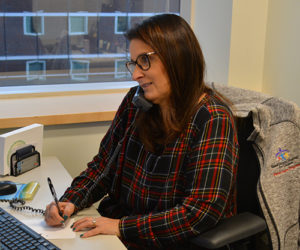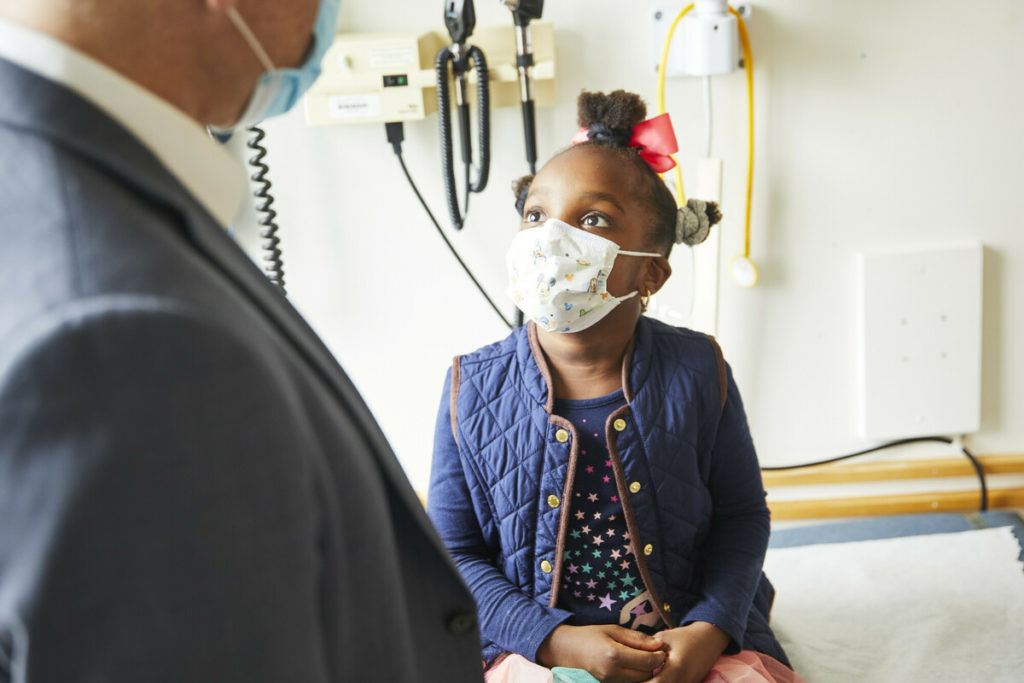As a pediatric nurse, Karen Parsons, RN, has always advocated for the smallest patients — the babies and children who didn’t have the voice or words to do so for themselves. She’s honed her empowering spirit with a personal touch over two decades of working with families.
Now, at the helm of the Fetal Care Program (FCP) at Massachusetts General Hospital, Ms. Parsons coordinates high-quality, specialty care for another group seeking comfort and steady hands in their most vulnerable moments: mothers and babies facing complications in pregnancy, delivery, the neonatal period and beyond.
“I’m a fighter, for both my patients and the program,” Ms. Parsons says. “It really makes a difference in people’s lives.”
“If There’s Something, Call Me”
Ms. Parsons, who has worked at Mass General for 25 years, helped launch the FCP with directors Anjali Kaimal, MD, MAS, and Cassandra Kelleher, MD, in 2015. As the program’s coordinators, Ms. Parsons and her colleague Jaclyn McGowan, NP, provide support for everything that families with complicated beginnings need, helping to make appointments, arranging tests and guiding them through the process.
Testing and monitoring for high-risk pregnancies includes screening for genetic syndromes, diagnostic procedures like amniocentesis, specialized ultrasounds, fetal echocardiograms and fetal MRIs. The FCP receives referrals from within Mass General, as well as many other hospitals: Newton-Wellesley, Wentworth Douglas, Salem, Nantucket, Steward Health, Cooley Dickinson and others. The program assisted 120 patients in its first year and has grown to serve almost 350 families annually.
Ms. Parsons sees families first when an anomaly is diagnosed, usually at around 20 weeks, and sticks with them until delivery. Either Ms. Parsons or Ms. McGowan attends appointments along with parents in person or on Zoom, taking extensive notes and following up with phone calls. Ms. Parsons gives all her patients her personal cell phone number, telling them, “If there’s something, call me. I’m here for you.”
“No matter what families are going through, you can’t always make the medical stuff better, but you can make their experience better by listening and showing that you’re there,” Ms. Parsons says. “Your presence makes things better for that family.”

A Personal Approach
Ms. Parsons always knew she wanted the Fetal Care Program to be personal and individualized. Before accepting patients, she spoke with other nurses, doctors and patients who had pregnancies with abnormalities or had to terminate the pregnancy.
Those conversations informed what makes the FCP unique. Constant communication and advocacy are key, Ms. Parsons says, with both the families and the doctors in various specialties. Patients see experts in maternal-fetal medicine, cardiology, orthopedics, neurosurgery, radiology, genetics, urology and many other disciplines, depending on the complication or abnormality. Ms. Parsons has extensive contact with every family, all the way until the baby’s first pediatrician visit. She writes congratulatory cards to families when babies are born, and “thinking of you” cards for parents who experienced a loss or had to make a difficult pregnancy decision.
“We really treat every patient as a person and not a number. The kind and caring nature we put into our program goes a long way,” Ms. Parsons says. “At Mass General, we also have that lifetime span, meaning that we’re able to see those babies before they’re born and then care for them into adulthood.”
The Dedication it Takes to Make a Difference
Covering all the bases at the FCP means that Ms. Parsons fills many roles: a social worker who helps find resources when a mother may need to temporarily move to Boston, an administrator who faxes records and registers patients, an advocate who works with attending physicians and other caregivers to find the best approach. Ms. Parsons is no stranger to this kind of juggle, as she and her husband — a 30-year veteran of the police force — have three children. Their oldest daughter is expecting her first baby and they also have a set of 26-year-old twins, with one in veterinary school.
Her dedication to the program means Ms. Parsons didn’t take a vacation for four years. Knowing how the FCP has helped families and her strong relationship with Ms. McGowan make the long hours worth it. And, as Ms. Parsons puts it, a little wine and candy along the way helps.
“We’re helping people through their worst times,” Ms. Parsons says. “You find out you’re pregnant and you have all these hopes and dreams for your future. People may have tried for years, and they finally have this baby, and something isn’t as they expected. We’re there to walk them through it.
“We get letters that say, ‘You don’t know how much it’s meant to have you be a part of this. Without you, we don’t know how we would have gotten through this,’” Ms. Parsons adds. “Knowing we make a difference — that’s the reward.”
- To make a gift or learn about supporting the Fetal Care Program, please contact us
- To contact the Fetal Care Program directly, please call 857.238.2273

